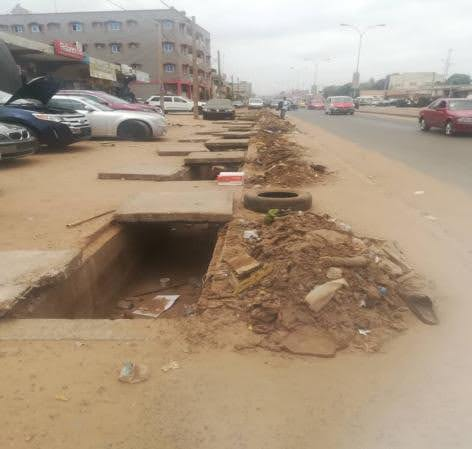By Nelson Manneh
As workers continue their annual task of clearing gutters along the Brikama–Westfield highway, business owners in the area are voicing complaints about the foul smells emanating from the waste left piled along the roadside.
According to several local shopkeepers, the process of removing waste is not only ineffective but also harmful to their health and business operations. They argue that leaving the waste on the roadsides for long periods before removal exacerbates the problem, creating an unhygienic environment for both vendors and customers.
“It would have been better if the workers removed smaller amounts of waste and evacuated them on the same day rather than leaving them here to pile up,” said Malang Fatty, a shop owner in Tallinding. “This is not hygienic; it causes more harm than good, especially for those of us who sell throughout the day. We’re constantly inhaling the dirty smell from the waste. The goal of cleaning the gutters is not fully achieved because, once the waste is removed and left here, cars run over it, dirties the road, and the trash ends up back in the gutters.”
Each year, as the rainy season draws to a close, the National Roads Authority (NRA) contracts private companies to clean gutters along the highway. This task involves removing waste accumulated in the drainage systems. However, the NRA has frequently criticized road users—especially street vendors—for improperly disposing of waste into the gutters, contributing to the ongoing sanitation problems.
The Anti-Littering Act of 2007, aimed at addressing the widespread issue of littering in public places, stipulates penalties for individuals caught dumping waste in public areas. Yet, according to critics, enforcement of this law has been weak, and littering remains a persistent issue in the country.
“If the Anti-Littering Act was properly enforced, the government wouldn’t have to spend millions of dalasis every year cleaning out these gutters,” said Lamin Fadera, a local resident. “The government is good at passing laws, but when it comes to implementation, they fail to act effectively.”
Fadera added that the practice of dumping waste into gutters is not limited to vendors but extends to everyday people. “I see people brewing attaya (green tea) and tossing its waste into the gutters. Vendors selling peanuts and corn often throw their waste into the same place. It’s a culture of bad practices that needs to stop.”
He suggested that the government introduce more enforceable waste management laws with strict penalties to curb the problem.
Mariatou Colley, another vendor on the highway, shared her frustration, explaining that the overpowering smell from the accumulated waste has forced her to close her shop for the past three days.
“I can’t even sit five meters away from the piles without inhaling the stench, which is harmful to our health,” Colley said. “The workers should be better organized to remove and evacuate the waste on the same day. It’s better for the work to take a little longer but be done properly, considering the health risks and other factors.”
One anonymous worker involved in the cleanup described the process as inefficient, with laborers split into different groups responsible for various stages of the operation. While some are tasked with opening the gutters, others remove the waste, and still, others close the gutters.
“From what I’ve seen, the workers responsible for evacuating the waste lack the necessary equipment,” the worker explained. “Using just a spade to throw the waste into the trucks is time-consuming and heavy work. If they had machines like excavators, the job could be done faster and more efficiently.”
This worker also clarified that leaving the waste on the roadside is not a deliberate decision by the laborers but a result of logistical constraints beyond their control.
Foroyaa attempted to contact the contracted companies responsible for the cleanup but was unsuccessful. The media outlet intends to continue its engagement on the issue and provide updates to its readers.
While the challenges of waste management in The Gambia are clear, the government, business owners, and workers alike must find ways to work together to mitigate the negative health and environmental impacts of this ongoing issue.



















